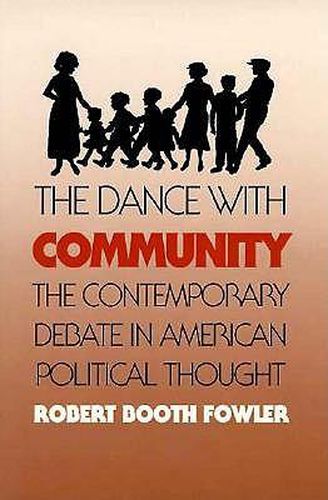Readings Newsletter
Become a Readings Member to make your shopping experience even easier.
Sign in or sign up for free!
You’re not far away from qualifying for FREE standard shipping within Australia
You’ve qualified for FREE standard shipping within Australia
The cart is loading…






Contemporary intellectuals have rushed to embrace the concept of community. What does this tell us about American political thought? Why are intellectuals uneasy with modern liberal individualism and its institutional policy results? Why is political intellectual discourse dominated today by complaint? In The Dance with Community Robert Booth Fowler reflects upon these and related questions. My goal, he writes, is to present contemporary political thought about community for what it is–a conversation interactive, spirited, and sometimes tough.
There have been many interpretations of the much-discussed decline in community spirit. Rather than offer another, Fowler steps back to look at the debate itself. He examines from the perspective of an intellectual historian the attention to community in current American political thought and explores the setting of that attention.
He also identifies five alternative models of community integral to the current debates and sketches a clear image of each–its relationship to others, the logic of its appeal, and its emphases and problems. In each instance he places the model into the larger conversation over alternative communities and the value of community itself.
$9.00 standard shipping within Australia
FREE standard shipping within Australia for orders over $100.00
Express & International shipping calculated at checkout
Contemporary intellectuals have rushed to embrace the concept of community. What does this tell us about American political thought? Why are intellectuals uneasy with modern liberal individualism and its institutional policy results? Why is political intellectual discourse dominated today by complaint? In The Dance with Community Robert Booth Fowler reflects upon these and related questions. My goal, he writes, is to present contemporary political thought about community for what it is–a conversation interactive, spirited, and sometimes tough.
There have been many interpretations of the much-discussed decline in community spirit. Rather than offer another, Fowler steps back to look at the debate itself. He examines from the perspective of an intellectual historian the attention to community in current American political thought and explores the setting of that attention.
He also identifies five alternative models of community integral to the current debates and sketches a clear image of each–its relationship to others, the logic of its appeal, and its emphases and problems. In each instance he places the model into the larger conversation over alternative communities and the value of community itself.